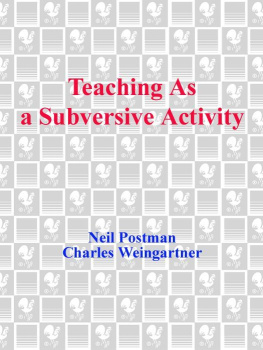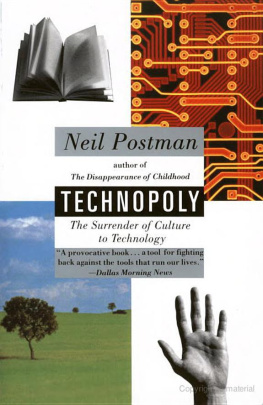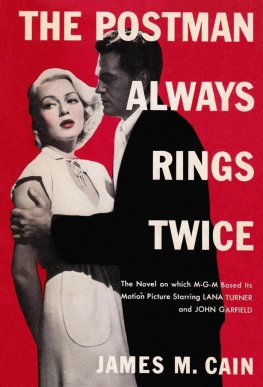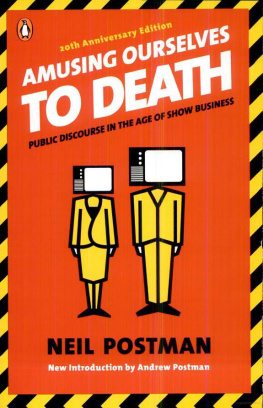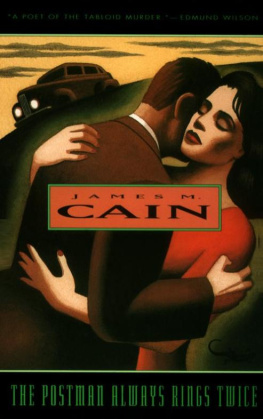Neil Postman - Teaching As a Subversive Activity
Here you can read online Neil Postman - Teaching As a Subversive Activity full text of the book (entire story) in english for free. Download pdf and epub, get meaning, cover and reviews about this ebook. year: 2009, publisher: Random House Publishing Group, genre: Religion. Description of the work, (preface) as well as reviews are available. Best literature library LitArk.com created for fans of good reading and offers a wide selection of genres:
Romance novel
Science fiction
Adventure
Detective
Science
History
Home and family
Prose
Art
Politics
Computer
Non-fiction
Religion
Business
Children
Humor
Choose a favorite category and find really read worthwhile books. Enjoy immersion in the world of imagination, feel the emotions of the characters or learn something new for yourself, make an fascinating discovery.
- Book:Teaching As a Subversive Activity
- Author:
- Publisher:Random House Publishing Group
- Genre:
- Year:2009
- Rating:5 / 5
- Favourites:Add to favourites
- Your mark:
- 100
- 1
- 2
- 3
- 4
- 5
Teaching As a Subversive Activity: summary, description and annotation
We offer to read an annotation, description, summary or preface (depends on what the author of the book "Teaching As a Subversive Activity" wrote himself). If you haven't found the necessary information about the book — write in the comments, we will try to find it.
Teaching As a Subversive Activity — read online for free the complete book (whole text) full work
Below is the text of the book, divided by pages. System saving the place of the last page read, allows you to conveniently read the book "Teaching As a Subversive Activity" online for free, without having to search again every time where you left off. Put a bookmark, and you can go to the page where you finished reading at any time.
Font size:
Interval:
Bookmark:

A DELTA BOOK
Published by Dell Publishing Co., Inc.
1 Dag Hammarskjold Plaza, New York, N.Y. 10017
Copyright 1969 by Neil Postman and Charles Weingartner
All rights reserved. No part of this book may be reproduced in any form or by any means without the prior written permission of the Publisher, excepting brief quotes used in connection with reviews written specifically for inclusion in a magazine or newspaper.
Delta TM 755118, Dell Publishing Co., Inc.
eISBN: 978-0-307-49170-1
v3.1
I
What did you learn in school today,
Dear little boy of mine?
What did you learn in school today,
Dear little boy of mine?
I learned that Washington never told a lie,
I learned that soldiers seldom die,
I learned that everybodys free,
Thats what the teacher said to me,
And thats what I learned in school today,
Thats what I learned in school.
II
What did you learn in school today,
Dear little boy of mine?
What did you learn in school today,
Dear little boy of mine?
I learned that policemen are my friends,
I learned that justice never ends,
I learned that murderers die for their crimes,
Even if we make a mistake sometimes,
And thats what I learned in school today,
Thats what I learned in school.
III
What did you learn in school today,
Dear little boy of mine?
What did you learn in school today,
Dear little boy of mine?
I learned our government must be strong,
Its always right and never wrong,
Our leaders are the finest men,
And we elect them again and again,
And thats what I learned in school today,
Thats what I learned in school.
IV
What did you learn in school today,
Dear little boy of mine?
What did you learn in school today,
Dear little boy of mine?
I learned that war is not so bad,
I learned about the great ones we have had,
We fought in Germany and in France,
And someday I might get my chance,
And thats what I learned in school today,
Thats what I learned in school.
T HIS BOOK is based on two assumptions of ours. One, it seems to us, is indisputable; the other, highly questionable. We refer to the beliefs that (a) in general, the survival of our society is threatened by an increasing number of unprecedented and, to date, insoluble problems; and (b) that something can be done to improve the situation. If you do not know which of these is indisputable and which questionable, you have just finished reading this book.
If you do, we do not need to document in great detail assumption (a). We do want, however, to remind you of some of the problems we currently face and then to explain briefly why we have not outgrown the hope that many of them can be minimized if not eliminated through a new approach to education.
One can begin almost anywhere in compiling a list of problems that, taken together and left unresolved, mean disaster for us and our children. For example, the number one health problem in the United States is mental illness: there are more Americans suffering from mental illness than from all other forms of illness combined. Of almost equal magnitude is the crime problem. It is advancing rapidly on many fronts, from delinquency among affluent adolescents to frauds perpetrated by some of our richest corporations. Another is the suicide problem. Are you aware that suicide is the second most common cause of death among adolescents? Or how about the problem of damaged children? The most common cause of infant mortality in the United States is parental beating. Still another problem concerns misinformationcommonly referred to as the credibility gap or news management. The misinformation problem takes a variety of forms, such as lies, clichs, and rumors, and implicates almost everybody, including the President of the United States.
Many of these problems are related to, or at least seriously affected by, the communications revolution, which, having taken us unawares, has ignited the civil-rights problem, unleashed the electronic-bugging problem, and made visible the sex problem, to say nothing of the drug problem. Then we have the problems stemming from the population explosion, which include the birth-control problem, the abortion problem, the housing problem, the parking problem, and the food and water-supply problem.
You may have noticed that almost all of these problems are related to progress, a somewhat paradoxical manifestation that has also resulted in the air-pollution problem, the water-pollution problem, the garbage-disposal problem, the radioactivity problem, the megalopolis problem, the supersonic-jet-noise problem, the traffic problem, the who-am-I problem, and the what-does-it-all-mean problem.
Stay one more paragraph, for we must not omit alluding to the international scene: the Bomb problem, the Vietnam problem, the Red China problem, the Cuban problem, the Middle East problem, the foreign-aid problem, the national-defense problem, and a mountain of others mostly thought of as stemming from the communist-conspiracy problem.
Now, there is one problem under which all of the foregoing may be subsumed. It is the What, if anything, can we do about these problems? problem, and that is exactly what this book tries to be about. This book was written because we are serious, dedicated, professional educators, which means that we are simple, romantic men who risk contributing to the mental-health problem by maintaining a belief in the improvability of the human condition through education. We are not so simple and romantic as to believe that all of the problems we have enumerated are susceptible to solutionthrough education or anything else. But some can be solved, and perhaps more directly through education than any other means.
School, after all, is the one institution in our society that is inflicted on everybody, and what happens in school makes a differencefor good or ill. We use the word inflicted because we believe that the way schools are currently conducted does very little, and quite probably nothing, to enhance our chances of mutual survival; that is, to help us solve any or even some of the problems we have mentioned. One way of representing the present condition of our educational system is as follows: It is as if we are driving a multimillion dollar sports car, screaming, Faster! Faster! while peering fixedly into the rearview mirror. It is an awkward way to try to tell where we are, much less where we are going, and it has been sheer dumb luck that we have not smashed ourselves to bitsso far. We have paid almost exclusive attention to the car, equipping it with all sorts of fantastic gadgets and an engine that will propel it at ever increasing speeds, but we seem to have forgotten where we wanted to go in it. Obviously, we are in for a helluva jolt. The question is not whether, but when.
It is the thesis of this book that changeconstant, accelerating, ubiquitousis the most striking characteristic of the world we live in and that our educational system has not yet recognized this fact. We maintain, further, that the abilities and attitudes required to deal adequately with change are those of the highest priority and that it is not beyond our ingenuity to design school environments which can help young people to master concepts necessary to survival in a rapidly changing world. The institution we call school is what it is because we made it that way. If it is irrelevant, as Marshall McLuhan says; if it shields children from reality, as Norbert Wiener says; if it educates for obsolescence, as John Gardner says; if it does not develop intelligence, as Jerome Bruner says; if it is based on fear, as John Holt says; if it avoids the promotion of significant learnings, as Carl Rogers says; if it induces alienation, as Paul Goodman says; if it punishes creativity and independence, as Edgar Friedenberg says; if, in short, it is not doing what needs to be done, it can be changed; it
Font size:
Interval:
Bookmark:
Similar books «Teaching As a Subversive Activity»
Look at similar books to Teaching As a Subversive Activity. We have selected literature similar in name and meaning in the hope of providing readers with more options to find new, interesting, not yet read works.
Discussion, reviews of the book Teaching As a Subversive Activity and just readers' own opinions. Leave your comments, write what you think about the work, its meaning or the main characters. Specify what exactly you liked and what you didn't like, and why you think so.

